College Sailing: Spring Season Update
Published on April 10th, 2019
Chris Klevan provides this week’s update from the seven conferences of the Inter-Collegiate Sailing Association (ICSA).
Last week, 12 of the 16 team race teams featured at the Laser Performance Team Race National Championship were confirmed as conference championships were sailed in New England, the Mid Atlantic, South Atlantic and the Pacific Coast. Meanwhile, the nation’s top women who aren’t sailing on the tema race circuit get into gear with Conference Championships looming and the informal fleet race section of the national schedule turns on.
The following schools have qualified for the Laser Performance Team Race National Championship:
• Yale University (NEISA)
• Georgetown University (MAISA)
• College of Charleston (SAISA)
• Stanford University (PCCSC)
• Boston College (NEISA)
• The United States Naval Academy (MAISA)
• Jacksonville University (SAISA)
• California Maritime Academy (PCCSC)
• Dartmouth College (NEISA)
• Hobart and William Smith Colleges (MAISA)
• Bowdoin College (NEISA)
• Fordham University (MAISA)
________________________
The Prosser Trophy is the Mid Atlantic (MAISA) Team Race Championship. The 8-team regatta is filled with six pre-qualified teams determined by the MAISA Team Race League and two sail-in spots established last weekend by the MAISA Team Race Challenge.
The Prosser was held by St. Mary’s College of Maryland and consisted of two 8-team round robins with the top four finishing teams qualifying for for Nationals. This makes events like the Prosser intense, not just at the top, but throughout the event. This year’s MAISA champion was Georgetown University.
Georgetown dropped only two races in the 14 races sailed. After a 7-0 start to the regatta, the Hoyas coasted to their second straight MAISA Team Race Championship and their fifth in the past seven years.
Perhaps the sharpest team race squad in the nation showed very little vulnerability as all but two of their twelve wins came with a 1-2 combination – one of those two was the stable 2-3-4. Georgetown sailed with their typical starting lineup. Andy Reiter ‘19, Sean Segerblom ‘20, Will Logue ‘20 with Haley Shea ‘19, Rebecca Fung ‘19, and Caroline Teare ‘21 are as seasoned and skilled as any three boats in the nation. The Hoyas proved this is in qualifying for the National Championships.
For Navy, it was a similar story, starting 6-1 to open the regatta and staying away from the battle that developed towards the final qualifying spots. Navy sailed Parker Loftus ‘20, Connor Bayless ‘21, Maxwell Brill ‘20, and Joseph Hermus ‘22 at the helm with Sally Johnson ‘22, Ana Mier ‘19, Emma Remis ‘20, and Kimmie Leonard ‘22 in the front.
The Midshipmen finished 11-3, splitting the two race series with Georgetown, Hobart and William Smith, and St. Mary’s.
“We have a lot of talented new players this year, so we’ve been learning and improving as they’ve been figuring out the game throughout the season,” said Navy Head Coach Ian Burman. “We felt that we were pretty fast, so we tried to use our speed to our advantage and sail clean races. Our crews did a great job with the big picture and that really helped our skippers focus on speed.”
Hobart and William Smith Colleges finished third with an 8-6 record. “The Prosser is intense,” said HWS Head Coach Scott Ikle. HWS started very slowly, losing four of their first seven races sailed. “We did a very good job relaxing with the wind delay,” continued Coach Ikle. “Maybe too good of a job.
“We were a team of penalties. Every race lost came with one or two 720s. If we weren’t spinning, we were winning. We need to clean that up. You could see that Georgetown and Navy were a week or two ahead of us.”
HWS rebounded well, sailing to a 5-2 record during the second round robin and pulling away from the fourth and final qualifying spot. “Hector [Guzman] and Maya [Weber] were outstanding this weekend,” continued Coach Ikle. “They worked magic to turn losing situations into winning ones. They were on.”
HWS sailed Charles Miller ‘19, Hector Guzman ‘20, and Kyle Easton ‘20 at skipper with Lindsey Kloc ‘19, Maya Weber ‘20, and Aidan Morgan ‘21 at crew.
“There was a lot of down time while we waited for wind,” continued Coach Burman. “At the end, it was really tight to get the last few races in before the time limit and a lot of teams were really close in the standings, so there was definitely some tension in the air. The wind was super puffy and shifty coming off the hill at St. Mary’s too, so no lead was safe at the end.”
The final qualifying spot was won by Fordham on what was the equivalent of a buzzer beater after an unexpected comeback. “Being honest, not a lot went well for us,” said Head Coach Johnny Norfleet. “We started the event 0-5 and lost a lot of close races. However, with Georgetown and Navy pulling away and the regatta so tight at the bottom, we knew we still stood a chance if we could beat the teams at our level.”
After losing to Georgetown with less than 10 total races remaining in the regatta, Fordham needed to win their last two races against Cornell and Old Dominion. They were winning from the starting line to the finish against Cornell, but a couple weak lee-bows and a bad pin layline call led to what appeared to spectators on shore as a late, comeback win for the Big Red of Cornell. However, a double red flag after the finish left Fordham the beneficiaries of a 1-3 scramble.
The win over Cornell kept Fordham in the driver’s seat. Their regatta would come down to their final race against ODU. “We were able to get some key wins in the second round and ultimately put ourselves in a position to race ODU for the final qualifying spot in our last race of the round,” continued Norfleet. “The team had been sailing well in the last few races and though we knew the situation on shore, we chose not to disrupt their flow by telling them that the race was winner take all for the final berth.”
Trailing to a 2-3-5 combination at mark 1, the Rams were hot on the Monarch’s tail. A red flag on the downwind pushed Fordham into a winning situation which they were able to maintain despite unstable conditions.
“The team performed well and were able to sail to a fairly comfortable win to lock up the final spot,” said Norfleet. “Qualifying for team race nationals was a big deal both to our current team and the broader history of our program.
“As a team, we designate a significant portion of our time and focus, both on and off the water, to learning and practicing team racing. To qualify for team race nationals is affirmation that our hard work has paid off.
“It was even sweeter knowing how far we have come in just one year after finishing 5th at the 2018 Team Race Challenge, effectively 11th in MAISA. This is only the second time in program history that we have made it to Nationals and the first time since 2015.
“Though there will have been a few years between these appearances, qualifying a second time shows that we have continued to grow our institutional team race knowledge and are on a path to becoming a regular contender for the Wood.”
Fordham sailed Tucker Hersham ‘20, Matt Cappetta ‘19, and Brad Seferian ‘20 at skipper and Annika Ekholm ‘20, Jacqueline Tobin ‘20, and Cortney Rielly ‘20 at crew.
________________________
NEISA Team Race Championship, also known as the Leonard M. Fowle Trophy, is New England’s equivalent to the Prosser. Like the Prosser, four teams qualify. Unlike the Prosser, however, there are 12 teams present, making for an event even tighter on time due to the light air across the east coast on Saturday. At the end of racing on Saturday, not even one round robin had been completed.
However, conditions were much improved on Sunday and the quality of team racing improved in turn. At the Prosser in MAISA, two teams pulled ahead making it possible for four losses to separate a podium position from dead last at the regatta. At the NEISA Championships, Boston University and University of Rhode Island combined for a 2-20 record, leaving the top end of the event extremely tight and therefore contentious.
Nine teams all had a chance to qualify as racing commenced on Sunday. Tufts lost a re-sail after the first round robin that would have otherwise made for a five-way tie to get into the round of 8. Every race on the course at any given time was incredibly critical to the overall standings.
Only five losses separated first place from seventh. “This is the most challenging regatta of the year,” said Dartmouth Head Coach Justin Assad. “There is hardly a difference between the top eight teams, and even the four teams that get eliminated sail every team tough in the round of 12; there are no easy wins. However, the depth of the field also makes the regatta really fun; every race is a battle.”
Yale won the regatta with a 14-4 record. Sailing behind their typical stable of skippers Nic Baird ‘19, Nick Hernandez ‘19, and Shawn Harvey ‘21 with Kira Woods ‘19 stepping in next to their regular crews, Sonia Lingos-Utley ‘21 and Graceann Nicolosi ‘20, respectively, the Bulldogs are NEISA Champions for the fourth consecutive year.
Yale took care of business sailing to a 9-2 record in the first round, losing only to Dartmouth and Boston College and a 5-2 record in the second round, losing to MIT and Bowdoin.
Boston College finished second with a 12-6 record sailing Wade Waddell ‘19, Sophia Reineke ‘21, Thomas Walden ‘20, and Isabella Loosbrock ‘19 at the helm at Katherine Bowman ‘20, Emma Perry ‘19, Caroline Downey ‘19, and Tara Ferraris ‘19 at the crew position.
The Dartmouth Big Green tied BC with a 12-6 record but lost the tie-break on a sail-off for podium position. Dartmouth sailed Chris Williford ‘19, Jack McGraw ‘20, and Timothy Greenhouse ‘21 at skipper with Rebecca McElvain ‘19, Carlota Hopkins Guerra ‘22, Paige Clark ‘20, and Eloise Burn ‘21 at crew.
“The goal is always to sail the best we can and continue to improve,” said Coach Assad. “We need to keep drilling on starts and polish our straight line speed. Much of that will come naturally when we are in the boats more, but those are the components we hope to focus on in the next 6 weeks.
“We were fortunate to sail strong in the challenging variable conditions on Saturday, and after a rocky start Sunday we were able to rally for the round of 8. Open constructive dialogue helped our helms stay on the same page.”
Bowdoin finished fourth, capturing the final qualifying spot and their first trip to the LaserPerformance Team Race National Championship in program history. “This championship has been our white whale for a number of years,” said Bowdoin Head Coach Frank Pizzo. “It is the first time we have qualified so the team is excited to compete in the upcoming Nationals.”
The Polar Bears of Bowdoin finished one race ahead of Roger Williams and in the waning races of the event, defeated Yale in their second to last race to get out of reach of a dangerous Roger Williams team.
“Our team had good boat speed the entire event so we never felt like we were out of the races,” continued Pizzo. “After underperforming at the Marchiando, we knew we had to get back to the basics so we primarily focused on starting and boat speed all week at practice.
“There were two critical moments for us. We were the first race of the day on Sunday against Harvard and we were able to spend some time before racing begin getting our boats up to speed. This early time on the water was critical. We were able to secure the final spot by defeating Yale in a wire to wire play 1. Our speed held off the top team at the event which was a good sign.
“The event is so competitive and is easily the hardest event to coach during the year. It was certainly a tension convention watching the races but we kept things light with the team. It is an important group to keep the mood light and joking around. We are looking forward to continuing to team race and continue to progress.”
With Women’s Fleet Race Championships now only two weeks away in most conferences, including New England, many of the top female sailors are working toward peak fleet race form. However, this was not the case for the top women in NEISA as they’ve reached top team race form first.
Five of the 22 skippers competing as part of the top-7 finishing schools were female, the highest ratio in memory. That coupled with the fact that Cornell sailed two of three women skippers at the Prosser suggests the future is bright for women in team racing across at the highest level.
________________________
College of Charleston won the South Atlantic (SAISA) Team Race Champs at UNC Wilmington. Finishing with an 8-2 record, the Cougars tied up-and-coming Jacksonville but won the tie-breaker due to a favorable 2-1 head to head record against the Dolphins of Jacksonville.
Though the event started slow for the Cougars with two early losses, both teams sailed away from the competition qualifying for the Laser Performance National Championship easily. The format was a full 5-team round robin followed by two rounds of 4. The regatta was a one day event.
Charleston sailed Jack Brown ‘21, Steven Leuck ‘20, and Augie Dale ‘19 at the helm and Hunter Skinner ‘20, Payton Alexander ‘19, and Katherine Lounsbury ‘20 at crew.
Jacksonville sailed Alfonso Garcia Bringas ‘20, Andre Guaragna ‘20, and Stephen VerHulst ‘19 at skipper and Daniel Ofarril ‘22, Caroline Bourgeois ‘22, and Ana Carrasco ‘21 at crew.
In conjunction with the SAISA Team Race Championship was the SAISA Coed Champs, sailed on the Sunday after the team race event concluded. SAISA is granted five slots to move on to the ICSA Coed Dinghy National Championship, held May in Newport, RI.
The 12-team event was crushed by College of Charleston wire to wire as they won the first race of the event and never looked back. Augie Dale and Katie Lounsbury dominated A-Division, winning the first four races before being pulled in favor of Jack Brown and Hunter Skinner. The replacements sailed to a 3,1,2 scoreline but were bested by Jacksonville over that three race stretch.
Jacksonville’s B-Division boat, Telmo Basterra ‘21 and Mia Porter ‘21, won five of the seven races for the the division win despite a DSQ.
Charleston finished with 34 total points and Jacksonville finished with 45. University of South Florida finished third with 60 points and Florida State University finished fourth with 68 points. University of Miami finished fifth to edge University of Florida out of the final spot at Nationals.
The two schools sailed neck and neck throughout as the Hurricanes of Miami never got more than five points ahead of the Gators. This event marks the only time the Gators have left their state thus far this season.
________________________
Stanford won the Pacific Coast (PCCSC) Team Race Championship with an impressive 15-0 record. Winners of the PCCSC in team racing since team race started being recorded on Techscore in 2013, this year’s Stanford team may be the most talented yet.
Sailing Jacob Rosenberg ‘20, Jack Parkin ‘21, Romain Screve ‘21, and Telis Athanasopoulos Yogo ‘22 at the helm and Kathryn Booker ‘19, Taylor Kirkpatrick ‘20, Meg Geril ‘19, and Sammy Pickell ‘22 in the front of the boat, Stanford is a legitimate threat to disrupt the dynasty that is National Championship winners from the East Coast. Sailing their normal starting lineup, Stanford has never finished outside the top-3 at a major interconference team race regatta.
California Maritime Academy finished second, claiming the final qualifying spot. The Keelhaulers sailed to a 11-4 record, edging University of California Santa Barbara. This is the first team race appearance for Cal Maritime, a team largely avoiding team racing of the past several seasons.
The Keelhaulers sailed Johannes McElvain ‘18, Benjamin Rohr ‘19, and Brock Paquin ‘22 at skipper and Hailey Thompson ‘22, Emi Stephanoff ‘21, and Matthew Thomas ‘21 at crew.
________________________________________
With many of the nation’s best women’s sailors team racing in NEISA and MAISA, the Emily Wick Trophy was slightly depleted. Nonetheless, with Conference Championships and qualifiers right around the corner, the regatta served as a needed barometer for the states of women’s fleet racing.
MIT and Brown pulled away from the competition at the midway point of the regatta and MIT edged Brown in the latter stages of the event. MIT finished with 155 points and Brown had 162. Third placed Harvard finished with 191.
The regatta leader changed 12 times before MIT came out with the win. After race 7, Brown and MIT exchanged the lead seven times just between the two schools. MIT took the lead for the final time at race 12B and held it until the end due to an impressive scoreline in both divisions to seal the regatta.
College of Charleston’s Alie Toppa ‘20 and Annabel Carrington ‘19 won A-Division, helping Toppa’s campaign as Quantum Women’s Sailor of the Year and effectively locking up Carrington’s status as an All-American crew. Toppa has now finished first or second in five of the six women’s interconference regattas in which she has sailed. Carrington has eight top-3 finishes in interconference regattas in both coed team racing and women’s fleet racing.
Dana Haig ‘22 and Brooke McGoldrick ‘20 and Sarah Caso ‘19 won B-Division. The MIT boat finished in the top-5 in 10 of the 14 races sailed.
Background: The ICSA is the governing authority for sailing competition at colleges and universities throughout the United States and in some parts of Canada. There are seven Conferences that schedule and administer regattas within their established geographic regions, with ICSA hosting two national championships in the fall and three national championships in the spring. collegesailing.org
2018 Fall Nationals
November 2-4 – Singlehanded – Holland, MI
November 16-18 – Match Racing – Newport Beach, CA
2019 Spring Nationals
May 21-24 – Women’s – Newport, RI
May 25-27 – Team Race – Newport, RI
May 28-31 – Coed – Newport, RI


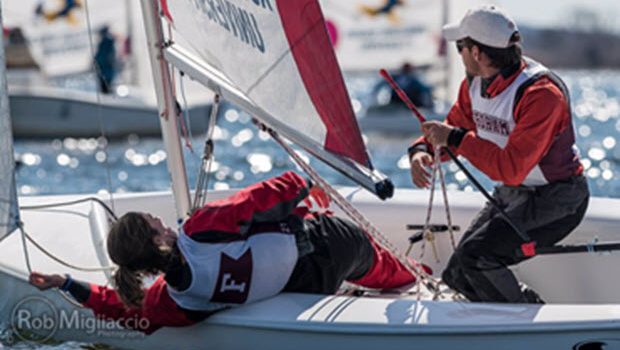



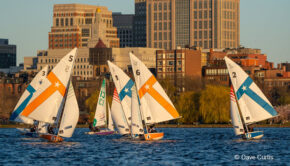
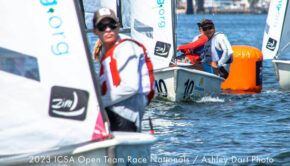
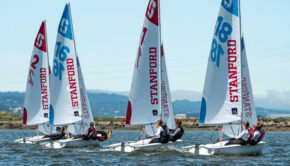
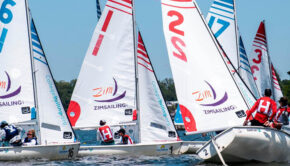
 We’ll keep your information safe.
We’ll keep your information safe.